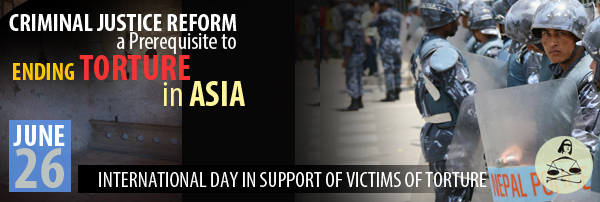The government of Nepal ratified the Convention Against Torture (CAT) in 1991, and passed the Torture Compensation Act (TCA) in 1996. The TCA, however, does not criminalize torture and focuses on compensation if police officers are found guilty of practicing torture. The TCA treats torture merely as a civil offence, which thereby encourages officers to continue practicing torture. This is the torturous reality found in Nepal in 2015, after 6 decades of human rights discussions.

For decades now, developed countries have been continually lobbying and carrying out advocacy work in Nepal targeting an end to the practice of torture, terming it as an inhumane and heinous crime. On the other hand, and at the same time, the same foreign countries as well as the international donor community have been supporting Nepal’s security agencies, especially the Nepal Police, financially as well as technically.
This support, for the criminal justice institutions, including the Nepal Police, has ostensibly been intended to modernize these institutions. In terms of the Nepal police, these funds have been allotted so the police can use modern and scientific form of investigation techniques in order to solve crimes, and maintain peace and stability in Nepal.
But, have the foreign advocates, donors, and well-wishers of the Nepali people, done a reality check on the nature of the institutions they have been lobbying and funding? Does the international donor community even know that Nepal’s police use torture as the primary method to get their work done? Do they know that this is the only method they use to carry out “investigation”?
If justice institutions still remain in a state of accelerated decay and the police routinely practice torture, decades after advocacy and funding, what is the point of international agencies and the neighboring and developed countries providing financial assistance to Nepal, especially assistance for Nepal’s law enforcement and security agencies? All carrot and no stick means something is amiss.
While torture and rights violations with utter impunity have continued and become a deeper part of the system, taking more sophisticated forms, the United Nations has been hiring the Nepal Army and the Nepal Police for its peacekeeping missions for decades now.
Either the international and donor community have no clue about how the police functions in a country like Nepal. If this is the case, a wake up call is in order. Police officers in Nepal and those in neighboring South Asian countries do not work without using torture; given that torture is the only means they have for “investigation”, and the primary tool to maintain inequality in the guise of law and order.
Or, perhaps the game is afoot for a while now, and the foreign and international agencies have closed eyes, ears, and mouths like Gandhi’s three learned monkeys, pretending not to see, listen, and speak against evil.
The Nepal government has certainly played the game for a long time. Ratifying CAT in 1991 was an act of mere lip service of the Nepal government to attract international funding and technical assistance for the Nepal Police. The government was never committed to modernize policing and reform justice institutions in a way that would allow these institutions to function independently. For, doing so, would have upset the apple cart, and would have disallowed unjust power. The same is as true today as yesterday.
Whether the international community is blissfully unaware or in pretense, the reality of how the funding has been utilized is plain to see. On the ground, torture continues with impunity amidst dysfunctional justice institutions. The police still do not have adequate technical and financial resources to carry out their work. Policemen still remain underfunded, and even lack basic resources like vehicles, petrol, stationary, and even proper offices for work.
There has to be a way to make the Nepal government understand that reforming its justice institutions, specially the criminal justice institutions, is the biggest priority. The Nepali people need to show the government its folly. But, so does the international community, with pressure and purse strings. Otherwise, being able to make a difference and not doing so makes donors collaborators.
The AHRC has received reports that the government has recently tabled the Anti-Torture Bill in Parliament again. The AHRC learned that the government has been trying to bring the law in order to extradite Colonel Lama, who has been undergoing trial in the United Kingdom for his involvement in conflict-era torture cases, under Universal Jurisdiction. But, this was before the earthquake. There has been no mention of the Bill since the quake and once again there appears to be no genuine political will to take this forward.
The Anti-Torture Bill that has been pending at the Parliament of course needs to be passed as soon as possible, but its provisions need to be brought in line with the UNCAT first. Every day, innocent Nepali citizens are being tortured in jails. So the sooner a strong Bill becomes law the better. However, the government of Nepal needs help in understanding the significance of this Bill. It is not simply for extraditing a person from the UK to Nepal. A law that criminalizes torture is needed to discourage torture as a means for investigation.
Unless the Nepal government brings concrete plans and policies, with tangible results that curtail the practice of police torture, foreign countries and donors should stop providing financial and technical assistance. If the international community is committed enough to help reform Nepal’s police force, they must take bold steps. But if they continue relentless support, then they are simply being “partners in crime” in the continued practice of torture in Nepal.
Therefore, the AHRC requests the international community to refrain from providing financial and technical assistance to the Nepal Police until the government of Nepal commits itself to ushering in modern policing, rooting out the practice of torture from its jurisdiction.